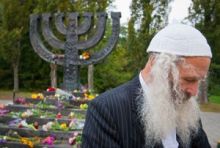The 71st anniversary of the Babyn Yar Massacre (when thousands of civilians, mostly Jews, were shot down that ravine in Nazi-occupied Kyiv) attracted some 200 individuals, among them Jews and Ukrainians, who took part in a mourning march and subsequent rally organized, on September 30, by the Jewish Council of Ukraine and the Babyn Yar Memorial Foundation.
The marchers formed a column by the memorial sign on the crossing of Melnykov and Dorohozhytska streets, then walked down to the Menorah Memorial, tagged by the organizers as the Death Route (here Babyn Yar Street once stretched, eventually to share its name with the notorious ravine). At Babyn Yar they held a mourning meeting and laid flowers. This was the 22nd occasion for the Jews in Ukraine, on an official site, compared to 24 occasions – starting with Jews gathering on this site right after the construction of the memorial.
This time the organizing committee made it clear that the Babyn Yar anniversary was in memory of the Jewish victims, because most of those killed in Babyn Yar had been Jews. The Soviets kept this death toll secret. According to one of the marchers, Stalin received a report to the effect that there were mostly Jews shot down the Babyn Yar ravine, and that he ordered the report edited, to the effect that there were “mostly Soviet citizens among the victims.”
After forming a nation-state [i.e., Israel] and asserting their rights, the Jews asserted their right to national memory. The head of the Jewish community stressed that Babyn Yar is the biggest international common grave, that this grave contains the remains of Jews and Ukrainians from Kyiv, as well as those of people from the west of Ukraine who left their homes trying to escape the Wehrmacht onslaught, seeking refuge in the east of Ukraine.
Israel’s Ambassador to Ukraine Reuven Dinel attended the ceremony and said the Babyn Yar tragedy remains to be studied as a symbol of a tragedy suffered by an entire nation. He believes the concept of an individual being murdered because of his/her parentage simply doesn’t make sense. “It is the sacred duty of each and everyone to remember this sad page in the history of our people, and to prevent such macabre events from happening in the history of other peoples… Jews have nothing to fear these days, because the state [of Israel] is responsible for every national, regardless of his/her whereabouts.”
Among the VIPs present during the Babyn Yar ceremony was the German Ambassador, Christoph Weil. He said that Babyn Yar was a symbol of blind racial and ideological hatred, eventually targeted on the Jewish people: “Today’s democratic Germany recognizes its historical responsibility and will maintain it,” Ambassador Weil declared. At the end of his speech, he read a Christian prayer for the dead.
Toward the end of the ceremony, the floor was given to Dmytro Pavlychko, a noted Ukrainian poet. He said as a child he had made friends with Jews in his native Ukrainian neighborhood, that there were mostly Jews and Poles in his grade school class; that he had watched a German soldier kill a Jewish boy, Pavlychko’s chum buddy. (A Hebrew version of Pavlychko’s “European Melodies” recently came off the presses in Israel.)
Pavlychko declared: “In the 20th century the heaviest losses were sustained by Jews and Ukrainians…” He further reminded those present of Ukraine’s ordeals, particularly Holodomor, the mass executions at Sandarmokh, then asked for a minute of silence, and then summed up: “What happened at Babyn Yar is a major crime against humanity perpetrated on Ukrainian territory.”
Finally, a minute of silence took place, followed by the flower-laying ceremony, to the accompaniment of the beautiful Ukrainian and Israeli national anthems.







